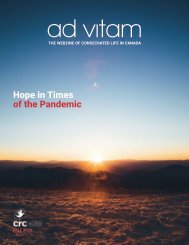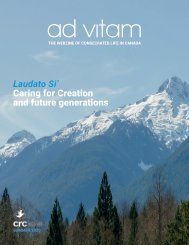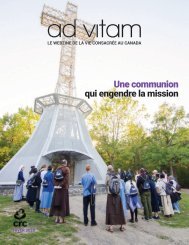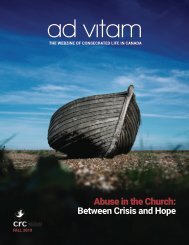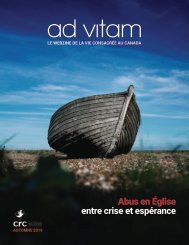ad vitam - Winter 2020
READING TIPS The ad vitam webzine is unique in its offer of an integral and interactive experience featuring articles and audio-visual content. We strongly suggest that you read it online, ideally on a computer or tablet (not recommended on a smartphone). To zoom in: on a computer, double-click or use the + and - found at the bottom-right of the screen; on a tablet, double-tap the screen. Use your mouse or finger to move throughout the page. It is possible to download a PDF of the webzine, however the file will not support links and audio-visual content. For environmental reasons, we invite you to limit printing of the PDF. You may contact us if you wish to obtain a text-only version of a specific article. We hope that as you acquaint yourself with our webzine over time, you’ll enjoy the enriching experience of its unique format. We welcome your comments and questions at info@crc-canada.org.
READING TIPS
The ad vitam webzine is unique in its offer of an integral and interactive experience featuring articles and audio-visual content. We strongly suggest that you read it online, ideally on a computer or tablet (not recommended on a smartphone). To zoom in: on a computer, double-click or use the + and - found at the bottom-right of the screen; on a tablet, double-tap the screen. Use your mouse or finger to move throughout the page.
It is possible to download a PDF of the webzine, however the file will not support links and audio-visual content. For environmental reasons, we invite you to limit printing of the PDF. You may contact us if you wish to obtain a text-only version of a specific article. We hope that as you acquaint yourself with our webzine over time, you’ll enjoy the enriching experience of its unique format. We welcome your comments and questions at info@crc-canada.org.
Create successful ePaper yourself
Turn your PDF publications into a flip-book with our unique Google optimized e-Paper software.
not just as a once-for-all event to deal with a<br />
particular issue. “The conversation is our life<br />
together” (Whitehe<strong>ad</strong>s, p.4).<br />
This brief overview does not convey the colour<br />
or flavour of the process in action, nor does it<br />
give an outline for the process. These will be<br />
unique in each circumstance where theological<br />
reflection is done, but the basic threefold<br />
movement will be the same.<br />
Some practicalities<br />
The process requires a significant time commitment<br />
from participants. This can be a<br />
challenge in a group with diverse schedules.<br />
Engaging in group theological reflection requires<br />
a certain level of skills for dialogue. Depending<br />
upon the tension or conflict generated<br />
by the particular experience the group chooses<br />
for reflection, facilitation may be necessary for<br />
the process to unfold well.<br />
Conclusion<br />
Based on this experience, and some others, I<br />
have seen that dialogue and communion are<br />
facilitated by the theological reflection process.<br />
While there are practical challenges to<br />
engaging in it, the possibilities it offers for deeper<br />
dialogue and communion are well worth<br />
the effort.<br />
References<br />
Kinast, Robert L. What Are They Saying About Theological Reflection?<br />
Mahwah, NJ: Paulist Press, 2000.<br />
Whitehe<strong>ad</strong>, James D. & Evelyn Eaton Whitehe<strong>ad</strong>. Method in Ministry:<br />
Theological Reflection in Christian Ministry. Kansas City, Mo.:<br />
Sheed and Ward, 1995.<br />
Young <strong>ad</strong>ults and theological reflection<br />
During my years in university campus ministry,<br />
I led student retreats and programs that included<br />
theological reflection. One such program<br />
was a day-long event, which consisted<br />
of a morning experience in a food bank, or a<br />
temporary shelter for women and children, or<br />
a soup kitchen for homeless men. In the afternoon,<br />
we reflected on the experience using<br />
the pastoral circle previously mentioned in<br />
this article. Each time, a student expressed<br />
to the group the awareness that as educated<br />
persons, they h<strong>ad</strong> a responsibility to challenge<br />
systems that are unjust for persons in poverty.<br />
I did not plant this thought. Much to my joy,<br />
they came to it from their own experience and<br />
engaging with it in theological reflection. I also<br />
saw these young people h<strong>ad</strong> good skills for<br />
dialogue, and could speak from a faith perspective<br />
when a safe space was provided.<br />
For your reflection:<br />
Identify an experience or situation in your<br />
congregation or ministry where theological<br />
reflection could foster dialogue and facilitate<br />
a decision.<br />
How might the process unfold in this situation?<br />
Do you feel a Spirit nudge to move it<br />
forward?<br />
AD VITAM • WINTER <strong>2020</strong> • 21




